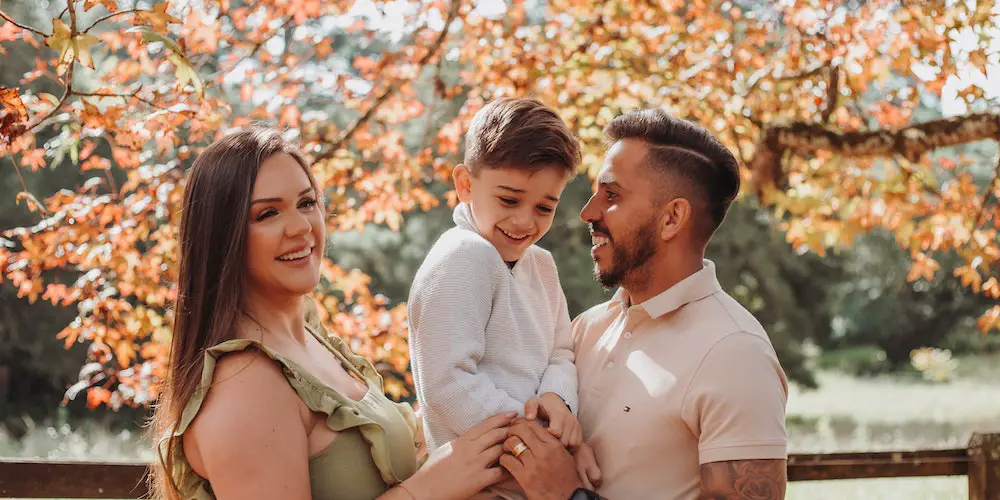In this article, you’ll learn about the impact of family dynamics on romantic relationships. So, if this interests you, then keep reading.

Introduction
In the realm of romantic relationships, the impact of family dynamics cannot be underestimated.
Our families shape us in profound ways, influencing our beliefs, values, and behaviors. These influences can have both positive and negative effects on our relationships with romantic partners.
Understanding and navigating the dynamics that stem from our family backgrounds is essential for building healthy and fulfilling romantic relationships.
In this article, we will explore the impact of family dynamics on romantic relationships, providing insights and guidance for individuals seeking to cultivate lasting love.
The Impact of Family Dynamics on Romantic Relationships

Here are some of the various impacts of family dynamics on romantic relationships.
The Formation of Relationship Patterns
The Role of Family Role Models
Our families serve as our primary role models for relationships. From a young age, we observe how our parents or caregivers interact with each other, witnessing their communication styles, problem-solving approaches, and emotional dynamics.
These observations become ingrained in our subconscious and often manifest in our own romantic relationships.
Whether we adopt similar patterns or consciously strive to break negative cycles, our family role models greatly influence the way we navigate intimacy and connection.
Inherited Communication Styles
Communication is a cornerstone of any successful relationship. The way we communicate with our romantic partners can be heavily influenced by our family dynamics.
If we grew up in an environment where open and effective communication was valued, we are more likely to carry those skills into our relationships.
On the other hand, if we witnessed poor communication or unhealthy conflict resolution strategies, we may find ourselves struggling to express our needs or resolve conflicts in a constructive manner.
Cultural and Religious Influences
The Weight of Tradition
Cultural and religious backgrounds often play a significant role in family dynamics and, consequently, in romantic relationships.
Traditions, customs, and expectations stemming from one’s cultural or religious heritage can impact various aspects of a romantic partnership, including gender roles, marriage expectations, and familial obligations.
Understanding and navigating these influences requires open-mindedness, respect, and effective communication between partners.
Balancing Individuality and Collectivism
Different cultures and religions place varying degrees of emphasis on individuality and collectivism.
In some societies, family ties and obligations take precedence over individual desires and aspirations.
This can pose challenges for individuals seeking to maintain a healthy balance between their personal autonomy and their commitment to their romantic relationship.
Finding a middle ground that honors both individual needs and familial expectations is crucial for relationship success.
Emotional Baggage and Healing
The Lingering Effects of Childhood Wounds
Family dynamics can leave lasting emotional wounds that carry over into our romantic relationships.
Childhood experiences of neglect, abuse, or unresolved conflicts can shape our ability to trust, be vulnerable, and form secure attachments.
It is important for individuals to recognize and address these wounds, seeking therapy or counseling, if necessary, in order to cultivate healthier and more fulfilling romantic connections.
Breaking the Cycle
While family dynamics may contribute to relationship challenges, they also present an opportunity for growth and healing.
Recognizing dysfunctional patterns and consciously working to break the cycle is a powerful step toward creating healthier dynamics in one’s romantic relationships.
By seeking self-awareness, practicing self-care, and actively engaging in personal development, individuals can forge new paths and establish healthier relationship patterns.
Nurturing Healthy Boundaries
The Influence of Boundaries
Family dynamics can significantly impact our understanding and implementation of boundaries within romantic relationships.
Boundaries define the limits and expectations we have for ourselves and others, safeguarding our emotional well-being and autonomy.
If we grew up in an environment where boundaries were respected and encouraged, we are more likely to establish and maintain healthy boundaries in our romantic relationships.
However, if our family dynamics lacked clear boundaries or exhibited boundary violations, we may struggle to set and enforce them in our own partnerships.
Setting Boundaries for Relationship Growth
Establishing boundaries in romantic relationships is vital for promoting growth, fostering respect, and ensuring individual needs are met.
Effective communication is key in discussing and negotiating boundaries with your partner.
It is essential to express your expectations, values, and limits while also actively listening to your partner’s needs.
By creating a safe space for open dialogue and mutual understanding, you can cultivate a relationship that honors and supports both individuals.
The Interplay of Love Languages
Understanding Love Languages
Love languages refer to the ways in which individuals prefer to give and receive love and affection.
These languages can be influenced by our family dynamics and upbringing.
The five primary love languages, as identified by Gary Chapman, include Words of Affirmation, Quality Time, Acts of Service, Physical Touch, and Receiving Gifts.
Being aware of your own love language and that of your partner can help foster deeper emotional connections and ensure that both individuals feel loved and appreciated.
Bridging the Love Language Gap
Differences in love languages between partners can pose challenges in a romantic relationship.
Understanding and accepting each other’s love languages is crucial for bridging this gap.
By openly communicating about your needs, expressing love in ways that resonate with your partner, and actively learning their preferred love language, you can cultivate a relationship that thrives on emotional connection and fulfillment.
The Impact of Family Expectations
Cultural and Societal Expectations
Family dynamics are often influenced by cultural and societal expectations surrounding romantic relationships.
These expectations may include the age of marriage, choice of partner, career priorities, and even the division of household responsibilities.
The clash between individual desires and external expectations can create tension and conflict within a romantic relationship.
It is important for individuals to navigate these expectations with sensitivity, open communication, and a shared commitment to finding a balance that honors both personal aspirations and familial values.
The Pressure of Comparison
Comparisons to other couples or family dynamics can also affect romantic relationships.
When individuals feel the pressure to measure up to certain relationship standards set by their families or society, it can create feelings of inadequacy, jealousy, or resentment.
It is crucial to remember that every relationship is unique, and focusing on your own journey, growth, and happiness is essential for a healthy and fulfilling partnership.
Embracing Individuality and Autonomy
Balancing Independence and Togetherness
Family dynamics can shape our understanding of individuality and autonomy within romantic relationships.
Some individuals may come from families that value independence and self-sufficiency, while others may have grown up in more tightly-knit families where togetherness is emphasized.
Finding a balance between independence and togetherness is essential for relationship success.
It involves respecting each other’s individuality, maintaining personal hobbies and interests, and nurturing shared experiences and connections.
Supporting Personal Growth
Healthy family dynamics promote personal growth and self-actualization. They encourage individuals to pursue their passions, develop their talents, and achieve their goals.
In romantic relationships, it is important to support and celebrate each other’s personal growth journeys.
By nurturing an environment that values individual aspirations and accomplishments, couples can strengthen their bond while also fostering their individual fulfillment.
Conclusion
The impact of family dynamics on romantic relationships is undeniable. Our families shape our beliefs, communication styles, boundaries, and expectations. They influence our love languages, our ability to navigate conflicts and our understanding of individuality and autonomy. By recognizing and understanding these influences, individuals can cultivate self-awareness, break negative cycles, and build healthier relationship patterns. With open communication, empathy, and a commitment to personal growth, couples can create lasting love and navigate the complexities of romantic relationships.
Frequently Asked Questions
1. How do family dynamics affect romantic relationships?
Family dynamics shape our beliefs, values, and behaviors, which in turn impact our romantic relationships. They influence our communication styles, problem-solving approaches, and emotional dynamics, and can either support or hinder relationship success.
2. Can negative family dynamics be overcome in a romantic relationship?
Yes, negative family dynamics can be overcome in a romantic relationship. It requires open communication, mutual understanding, and a willingness to break negative cycles. Seeking therapy or counseling can also provide valuable tools for addressing and healing from past family wounds.
3. What if my partner’s family dynamics clash with mine?
Conflicting family dynamics can present challenges in a romantic relationship. It is important to approach these differences with empathy, respect, and open-mindedness. Finding common ground, setting boundaries, and prioritizing effective communication can help navigate these challenges.
4. How can I heal from childhood wounds that affect my romantic relationships?
Healing from childhood wounds begins with self-awareness and a commitment to personal growth. Seeking therapy or counseling can provide valuable support in addressing and processing these wounds. Additionally, practicing self-care, cultivating healthy coping mechanisms, and surrounding oneself with a strong support system can contribute to the healing process.
5. Are family dynamics the sole determinants of relationship success?
While family dynamics play a significant role in relationship dynamics, they are not the sole determinants of success. Individual factors, such as personal values, communication skills, and emotional intelligence, also influence relationship outcomes. It is important to recognize the impact of family dynamics while also acknowledging and nurturing individual growth.
6. Can positive family dynamics enhance romantic relationships?
Yes, positive family dynamics can enhance romantic relationships. Growing up in an environment characterized by healthy communication, trust, and emotional support can provide individuals with valuable relationship skills and a strong sense of security. These qualities can contribute to the creation of a nurturing and fulfilling romantic partnership.



